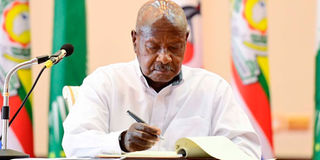Prime
Museveni: Uganda won’t support homosexuality

President Yoweri Museveni. PHOTO | PPU
What you need to know:
- The President’s remarks, which drew applause from congregants, were in response to pleas by the Church of Uganda Archbishop, His Grace Stephen Kaziimba Mugalu, for the government to join the Church in condemning homosexuality and legislate against it.
- Luwum was killed in 1977 for what was believed to be his criticism of rights violations during Idi Amin’s regime
President Museveni has said Uganda will not embrace homosexuality and the West should stop seeking to impose its views to compel dissenting countries to “normalise” what he called “deviations”.
Officiating at the national celebrations to mark Janani Luwum Day at Wii-Gweng village in Mucwini Sub-County, Kitgum District, Mr Museveni said “we are not going to follow people who are lost. These Europeans are not normal, they don’t listen”.
“We have been telling them ‘please, this problem of homosexuality is not something that you should normalise and celebrate,” he said, adding, “They (Western countries) don’t listen, they don’t respect other people’s views and they want to turn the abnormal into normal and force it on others. We shall not agree.”
The President’s remarks, which drew applause from congregants, were in response to pleas by the Church of Uganda Archbishop, His Grace Stephen Kaziimba Mugalu, for the government to join the Church in condemning homosexuality and legislate against it.
“Now we request you to give attention to what you have already started because we have homosexuals and other vices attacking our nation. Like late (Archbishop) Luwum was bold, we want to call out government to be bold and come out to fight all these vices that will kill our nation,” said the prelate.

The clergy attend the national celebrations held to mark Janani Luwum Day at Wii-gweng Village, Mucwini Sub-county in Kitgum District on February 16, 2023. PHOTO | PPU
Luwum was Archbishop for Uganda, Burundi, Boga Zaire and Rwanda, and he was killed in 1977 for what was believed to be his criticism of the state-inspired bloodletting and rights violations during Idi Amin’s regime.
He was also vocal about general excesses of the government and social ills of the time, the latter being what Archbishop Kaziimba seized on yesterday to call for national reflection and action against homosexuality.
Uganda is among 77 countries that criminalise gay and lesbian practices, according to the United Nations.
The subject of sexual orientation has lately polarised clerics and believers after Pope Francis, the head of the 1.3 billion Catholics and Archbishop of Canterbury Justin Welby, while on a joint visit to the Democratic Republic of Congo and South Sudan this month, declared that laws criminalising homosexuality were “sin … and an injustice”.
The Church of England, from which other Anglican provinces derive, tossed an explosive into the discourse after its governing body on February 9 voted for priests to bless same-sex couples in civil marriages.
In a swift rejoinder, Archbishop Kaziimba of the Province of Church of Uganda, which in 2008 broke ranks with the Episcopal Church of America, as the Anglican Church there is called, over consecration of a gay as bishop, said the Canterbury decision contradicted teachings of the Bible and God.
“That [decision to bless same-sex couples] is wrong,” he wrote, “As Church of Uganda we cannot accept that. God cannot bless what He calls sin.”
The fight back was followed with a proclamation by the Inter-Religious Council, an apex forum for leaders of different faiths in Uganda, who asked the government to enact a law similar to the quashed Anti-Homosexuality Act.
In echoing the demand at yesterday’s function in Gulu, Archbishop Kaziimba, in a plea to President Museveni, said “we request that the [Anti-Homosexuality Act] you signed previously against homosexuality should be revisited and signed again”.
Parliament passed the legislation then over claims of foreign-sponsored gay and lesbian recruitment in the country, and similar allegations have remerged, but the Constitutional Court struck it down on technicality that it was enacted without quorum.
The Act provided that a person who purports to contract a marriage with anotherperson of the same sex commits the offence of homosexuality and is liable, on conviction, to imprisonment for life. On a trip to the United States after signing the Anti-Homosexuality Act into law, President Museveni was confronted at hotels and on streets with pro-gay protests, and he upon return to Kampala warned Members of Parliament against plans to revive the annulled law, warning that it had foreign policy implications.
However, with lapse of time and allegations of rising homosexual recruitment mainly targeting students, and a one Elisha Mukisa publicly identifying as one victim recruited from a city school at age 17 and paid to feature in homosexual pornography videos, the demand for the government and educational institutions to act has grown louder.
The National NGO Bureau, the statutory regulator of the civil society sector, in a leaked January 2023 report named a number of Non-Governmental Organisations (NGOs) it said are suspected of promoting Lesbian, Gay, Bisexual, Transgender, Queer, Intersex-Plus (LGBTQI+).




